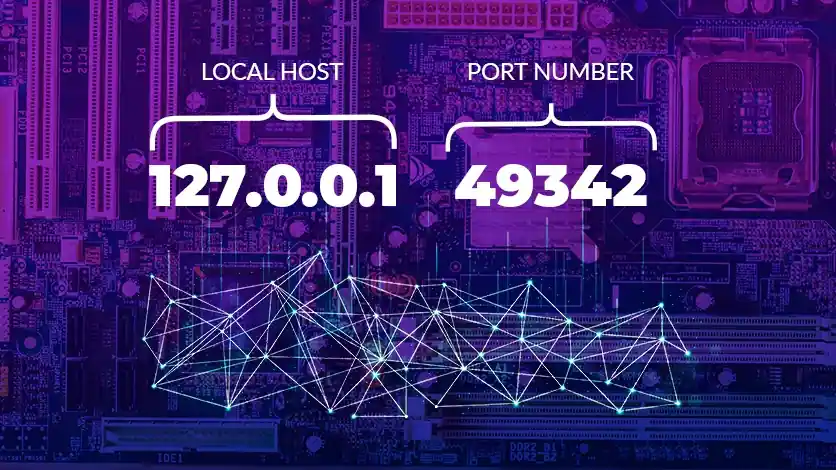Introduction to “127.0.0.1:49342”
When diving into the world of networking and web development, the combination of “127.0.0.1:49342” often pops up. But what does it mean? Let’s break it down, so everyone can understand. In essence, “127.0.0.1” refers to the local machine or computer you’re working on, commonly known as “localhost.” Adding the port number “49342” opens up an essential component of networking, allowing different applications or services to connect via a specific entry point. This guide will explain everything, from the basics of IP addresses to the significance of this particular setup.

What is an IP address?
An IP (Internet Protocol) address is a unique set of numbers assigned to every device connected to the Internet. Think of it as the home address for your computer or phone. Without it, devices wouldn’t know where to send data, much like trying to send a letter without an address.
Public vs. Private IP addresses
There are two main types of IP addresses: public and private. Public IPs are visible to the internet, whereas private IPs are used within a local network, like your home or office. Localhost, represented by “127.0.0.1,” is a private IP address, meaning it’s only accessible within your device.
Breaking Down the “127.0.0.1”
What does 127.0.0.1 represent?
In simple terms, “127.0.0.1” is your computer’s way of referring to itself. It’s like looking in a mirror and saying, “Hey, that’s me!” It’s known as the loopback address, which means any data sent to “127.0.0.1” will come right back to your computer.
Localhost in networking
In the world of networking, “localhost” is critical for testing. Developers use it to simulate how applications will behave online without needing an actual internet connection.
Introduction to Ports
What are ports in networking?
Think of a port as a door on a building. Just like a building might have different doors for entry, computers have multiple ports to manage different types of communication. Each port has a unique number, and these numbers tell the computer where to send the data.
Port 49342: What You Should Know
Dynamic ports and their roles
Port 49342 is part of the dynamic or private port range (49152–65535). These ports are typically assigned temporarily and automatically to different applications, often used in local testing environments.
The Role of Localhost and Ports in Development
Using localhost for software development
For developers, “127.0.0.1:49342” is a go-to setup for running applications locally. It’s particularly useful in web development when you’re testing how an app will behave without affecting live servers.
Security Concerns with 127.0.0.1:49342
Is localhost secure?
While localhost is generally safe, open ports can expose your machine to risks. Port 49342, being dynamic, may pose minimal security threats, but it’s essential to monitor which ports are open, especially when connected to the internet.
Configuring Localhost and Ports
How to change or close specific ports
Managing ports is key for security. If you don’t want a specific port like 49342 to remain open, you can configure your firewall to block or close it.
Troubleshooting 127.0.0.1:49342 Issues
Common issues with localhost and port access
Sometimes, you might encounter issues accessing services via “127.0.0.1:49342.” This could be due to conflicts with other applications trying to use the same port, or the firewall blocking it.
Practical Applications of 127.0.0.1:49342
Use cases in web development
Web developers often use “127.0.0.1:49342” to test server responses, debug APIs, or develop web applications locally before deploying them to production.
127.0.0.1:49342 is a specific network address used to refer to your local computer or localhost. Let’s break down the components to understand its meaning:
127.0.0.1
- IPv4 Address: This is a unique identifier assigned to your computer on your local network.
- Loopback Address: It’s a special address used to refer to your own computer, bypassing the need for network communication.
49342
- Port Number: This specifies a particular application or service running on your computer. In this case, 49342 indicates a specific port that is being used for communication.
In essence, “127.0.0.1:49342” means that you’re trying to connect to a specific service or application running on your local computer, using port 49342.
Common Uses of “127.0.0.1:49342”
This address is frequently used in various contexts, including:
- Web Development: When testing web applications locally, you might use this address to access the application running on your computer.
- Networking: Network administrators often use this address to configure network settings or test connectivity.
- Programming: Developers may use this address to connect to services or applications running on their local machines.
Examples of Using “127.0.0.1:49342”
Here are some practical examples of how you might encounter “127.0.0.1:49342”:
Web Development
- Accessing a Local Web Server: If you’re running a local web server on your computer, you might access it using a URL like
http://127.0.0.1:49342. - Debugging Web Applications: Developers often use this address to debug and test web applications running on their local machines.
Networking
- Configuring Network Settings: Network administrators might use this address to configure network settings, such as firewall rules or routing tables.
- Testing Connectivity: You can use this address to test if your network connection is working properly.
Pros
- Local Access: You can access services and applications running on your own computer without requiring a network connection.
- Testing and Development: This address is ideal for testing and developing applications locally before deploying them to a production environment.
- Security: Using “127.0.0.1” can help isolate your local network from external threats.
Cons
- Limited Scope: This address is only accessible from your local computer. You cannot access services running on other devices or networks.
- Potential for Misconfiguration: If not used correctly, “127.0.0.1” can lead to configuration errors or prevent you from accessing external services.
- Dependency on Local Setup: The availability and functionality of services running on “127.0.0.1:49342” will depend on your local network configuration and installed applications.
Conclusion
To sum it up, “127.0.0.1:49342” is an incredibly useful tool in networking and development. Whether you’re a beginner learning about localhost or an experienced developer troubleshooting port issues, understanding how this setup works is essential. Its versatility in testing and debugging makes it a favorite among developers worldwide.
Related Article: How to Spot and Avoid the 9300120111410471677883 USPS Package Scam
FAQs
- What does “127.0.0.1” stand for?
“127.0.0.1” is the loopback address used to refer to your local machine. - What is the purpose of port 49342?
Port 49342 is a dynamic port often used in local development environments. - Is “127.0.0.1” the same as localhost?
Yes, “127.0.0.1” is the numeric representation of localhost. - Can port 49342 be changed?
Yes, you can configure and change the port as needed for your application. - Is localhost secure?
Generally, yes, but it’s important to monitor open ports for potential vulnerabilities.












Be First to Comment